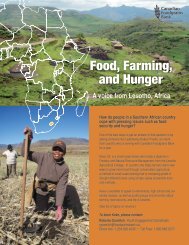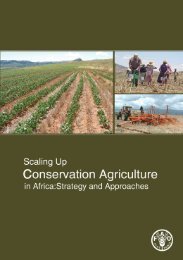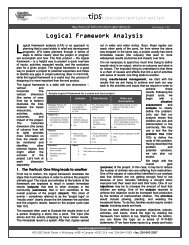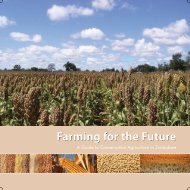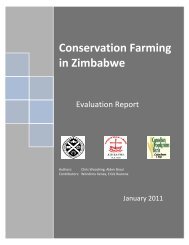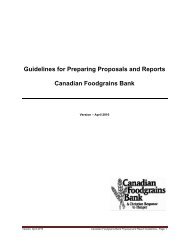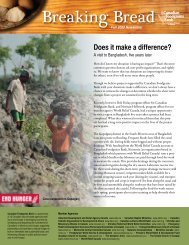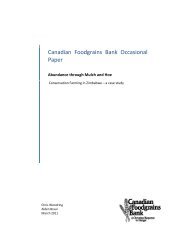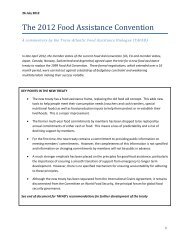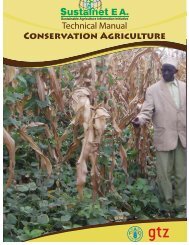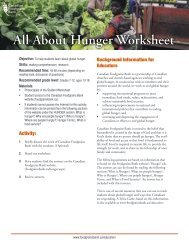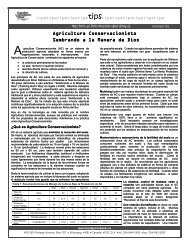Restoring the Soil - Canadian Foodgrains Bank
Restoring the Soil - Canadian Foodgrains Bank
Restoring the Soil - Canadian Foodgrains Bank
Create successful ePaper yourself
Turn your PDF publications into a flip-book with our unique Google optimized e-Paper software.
Choosing The Right GM/CC Cropping System For A Specific Area23<strong>the</strong>n leave it growing through <strong>the</strong> dry season after <strong>the</strong> traditional crop is harvested.An example of this method is S7, <strong>the</strong> maize/sweet clover system in Mexico.e) The gm/cc can be grown under fruit or forest trees or almost any perennialcrops. In this case, we choose particularly shade-resistant gm/ccs, like jackbeans orCentrosema pubescens.f) Occasionally we can use o<strong>the</strong>r ways of growing gm/ccs without affecting <strong>the</strong>main crop. These include growing gm/ccs during periods of frost (lupines, such astarwi, often do well), in soils that are too acidic for our crops (mucuna or buckwheat),or during very short periods of time (as in <strong>the</strong> case of Sesbania rostrata).2. Gm/ccs must not cost money. This rule implies that farmers must be able to produce<strong>the</strong>ir own gm/cc seed year after year, and that <strong>the</strong> gm/ccs must have no diseaseor insect problems that are serious enough to significantly diminish <strong>the</strong>ir growth.Insect attacks that do not affect <strong>the</strong> growth of <strong>the</strong> plants are fine; <strong>the</strong>y merely helpprocess <strong>the</strong> organic matter. If an insect or disease problem does significantly reduce agm/cc’s growth, we must usually discard that species and start using ano<strong>the</strong>r one. TheBrazilians, for instance, quit using lablab beans some 20 years ago because it was tooheavily attacked by insects. This rule also means we cannot use inoculants (commercialproducts that increase <strong>the</strong> fixation of nitrogen).3. Gm/ccs must not increase labor costs very much. This rule means that, exceptwhere animal traction or tractors are being used, gm/ccs will have to be left on <strong>the</strong> soilsurface. It also means that <strong>the</strong> intercropping of gm/ccs is particularly advantageous,because <strong>the</strong> weed control <strong>the</strong> gm/cc provides when it is intercropped can often savemore labor than <strong>the</strong> labor needed for planting and cutting down <strong>the</strong> gm/cc.The labor problem is also <strong>the</strong> main reason why farmers appreciate zero till systems.Farmers will often decide to plant gm/ccs primarily because of <strong>the</strong> hope that <strong>the</strong>y willnever again have to plow or hoe <strong>the</strong>ir fields. Since farmers must maintain high levelsof organic matter in <strong>the</strong> soil in order to be able to use a zero till system indefinitely,this desire to eliminate <strong>the</strong> plow or <strong>the</strong> hoe is a motivating factor for <strong>the</strong> long-term useof gm/ccs.4. Gm/ccs must fit into <strong>the</strong> existing farming systems. Gm/ccs will be seen as muchless important than food or cash crops, at least for <strong>the</strong> first few years. Thus farmersand extension workers have to adjust <strong>the</strong> gm/cc to fit into <strong>the</strong> already-existing croppingsystem, ra<strong>the</strong>r than adjust <strong>the</strong> farming system to fit some way of growing a gm/cc.5. The gm/cc should provide at least one important benefit in addition to improving<strong>the</strong> soil. In a worldwide study of gm/cc systems that were taught to farmers throughprograms, almost all of <strong>the</strong> gm/cc systems that persisted after <strong>the</strong> development organizationhad left <strong>the</strong> area were those systems that produced important benefits aboveand beyond soil improvement. Thus, whenever possible, we should promote gm/cc



